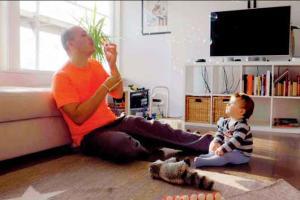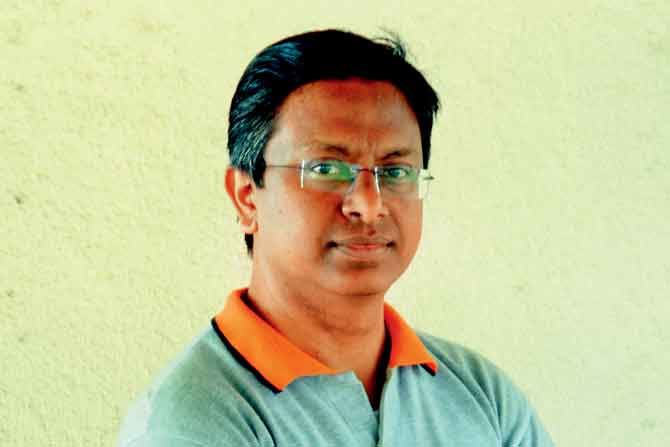A filmmaker in Norway looks at the struggle divorced fathers face for time with their kids in a new project that activists and men in Mumbai say resonates with them, especially during lockdown

Paulo Chavarria's 1.5-year-old son has been around him through the research and filming process since he was on paternity leave when the idea of making this film came to him
Praveen Kedare, 41, saw his son last on February 29 this year. It was the last Saturday of the month, and the only day Kedare is permitted to meet the 14-year-old. Ten minutes after they walked into the Children Complex inside Thane court, his son stormed out of the room. "I am scared of him [Kedare]," the son had said, taking cover behind his mother. "He looked at me as if I was a stranger. It broke my heart. He wasn't registering what I was saying and stared blankly at the ceiling. I was given two hours with him, but the meeting was cut short," the Kopar Khairane resident recollects.
Kedare is a non-custodial parent (NCP) engaged in a matrimonial dispute, and the teenager's custody is with his wife. The couple filed for a divorce in 2016. While their separation plea is yet to be finalised, it is not the end of their 13-year-long marriage that has bothered him. "The fact that I haven't been allowed to meet my son in four years is. He was only 10 when she left without informing me."
ADVERTISEMENT
An RTI plea filed by a Tardeo parent in 2012 revealed that there are over 176 non-custodial parents in the city who are allowed access to their children only within the confines of the Children Complex of the Bandra family court. The small 200 sq-ft room, with benches lining the walls offers nothing but a harrowing experience to the children. Amit Deshpande, men's rights activist and founder of Vaastav Foundation, says, "It is unfair for a child to meet the parent in this environment. Sometimes, the child is prejudiced by what he has been told by one parent. If one scared child begins to cry, others in the room start wailing, too. It is completely chaotic. So even if the father wants to create a reassuring bond, he cannot."
Kedare says he has been running from pillar to post to gain complete custody of his son. "I approached the Child Welfare Committee [CWC] and Belapur and Thane courts, but in vain. Finally, I filed a custody case, and in January this year, the Thane court permitted me access to my son on the third and fifth Saturday of every month. But just when my wife was asked to comply with the order, the lockdown was imposed. I don't know when I will see him next."

Paulo's son Viggo meets his grandfather Edgar in Costa Rica for the first time during the documentary shoot
Paulo Chavarría, a Costa Rica-born filmmaker and now Norway resident, would understand Kedare's anguish. Chavarria, 41, is making a film on fathers who fight to secure equal time with their children after divorce. Titled, The Bothersome Father—Paradox in the Land of Equity, Chavarría interviews parents who want a change in policy. At the centre of the film is Chavarría's own divorce and custody struggle. "I was married for 10 years to a Norwegian resident, and we have two sons. The conflicts began in 2015, and we decided to part ways. Fortunately, we managed to negotiate child custody arrangements outside of court, and I meet my sons often," Chavarría says in a telephonic interview.
And so, it's not his own but his father Edgar's divorce that inspired him to make the film. "When I was growing up, I knew I had two half brothers. I had only seen them in pictures. I saw my father experiencing pain, when he ended the marriage with his first wife and was no longer able to meet his sons. While he had me, he would miss his first borns, especially on Christmas or New Years." When he got divorced, it prodded him to research custody laws in Norway. After speaking to multiple sets of parents, he realised that the struggle men faced with custody was commonplace across the world.
The film sees Chavarría travel to Costa Rica to meet his father, accompanied by his 1.5-year-old son Viggo from his partner. "I also have two sons with my Norwegian partner. When the youngest was born, I was on paternity leave and home with him all the time. It was around the same time that I started filming, so he has accompanied me everywhere. He even features in the film, and at one point, meets his grandfather for the first time."
The film is poignant for the insight it offers into a culture usually regarded as progressive and inclusive. "Norway is said to be progressive, but is conservative with regard to custody laws. The mother is considered the primary caregiver. But isn't the father's role equally important in the child's overall growth? The film shows the dark side," Chavarría adds.
In the United Kingdom, only eight per cent of fathers function as single parents. In Germany, local laws give sole custody to the mother unless she consents to joint custody. In India, the Guardians and Wards Act, 1890 is the universal law pertaining to issues involving child custody and guardianship, regardless of the child's religion. The Supreme Court of India has consistently held that in deciding cases of child custody "the first and paramount consideration is the welfare and interest of the child and not the rights of the parents under a statute". "And yet, a majority of custodies are granted to mothers. The problem is that we are conditioned to believe mothers are better caregivers. If a child is less than five years old, a father can forget about getting custody as the infant is required to be around the mother while growing up. If the child is older, it depends on factors like financial and emotional stability of the parents before considering custody arrangements.

Amit Deshpande, activist
But, what we, at Vaastav Foundation argue for is the need for provisions for shared parenting," Deshpande explains. He adds that it will help if divorce cases are normalised in India. "Let's accept divorces are normal, too, so that custody problems can be solved. This transition is already tough on kids and on both the parents. So let's end this bias and have laws to make it easier for all the parties involved."
Chavarría feels the change needs to come within the judiciary. "In a few judgments, it was observed that the fathers were more aggressive with the kids. This is not true. Statistics show that in Norway, mothers are as likely to be violent with their kids as their fathers. I want to dispel myths that make it difficult for fathers to get a fair deal in court." While Chavarría has been fortunate enough to meet both his older sons, who are living with his ex-wife, during the lockdown, there are many who are struggling to see their kids even on video call. "I've received a lot of feedback from fathers struggling to connect with their children during the lockdown. How will they survive the quarantine?" Chavarría wonders.
With the Bandra family court shuttered, the situation is not any different here. Kedare says, "Lawyers are not available so I prepared a plea on my own and visited Thane court last week to get e-access. Since litigants are not allowed in, I had to return home. I've had 10 wonderful years with my son. How do I forget him?"
A landmark judgment
In February this year, a bench of justices AM Khanwilkar and Ajay Rastogi made observations in a Supreme Court judgment on a matrimonial dispute. Overturning the order of the Delhi HC that had denied a father time with his children, it said that the courts should decide the issue of custody while keeping in mind the best interest of the child who is the "victim" in the custody battle, and if efforts to settle the matrimonial dispute through the process of mediation do not fructify, then the courts should make an endeavour to resolve it as expeditiously as possible because with every passing day the child pays a heavy price. The SC, while deciding the matter, said, "primary and paramount consideration is always the welfare of the child" and "if the welfare of the child so demands, then technical objections cannot come in the way".
Catch up on all the latest Mumbai news, crime news, current affairs, and a complete guide from food to things to do and events across Mumbai. Also download the new mid-day Android and iOS apps to get latest updates.
Mid-Day is now on Telegram. Click here to join our channel (@middayinfomedialtd) and stay updated with the latest news
 Subscribe today by clicking the link and stay updated with the latest news!" Click here!
Subscribe today by clicking the link and stay updated with the latest news!" Click here!







